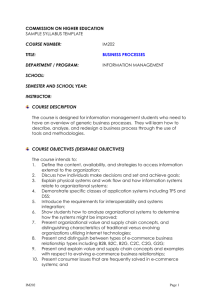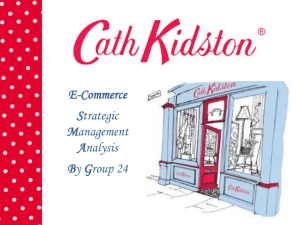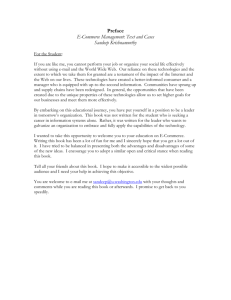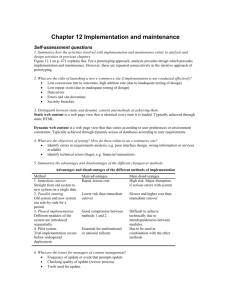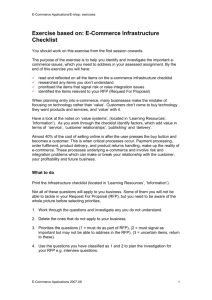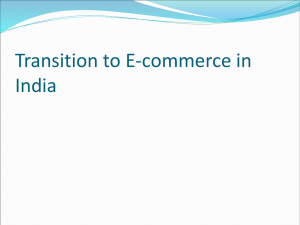EVENTUAL TOPICS FOR PAPER RESEARCH
advertisement
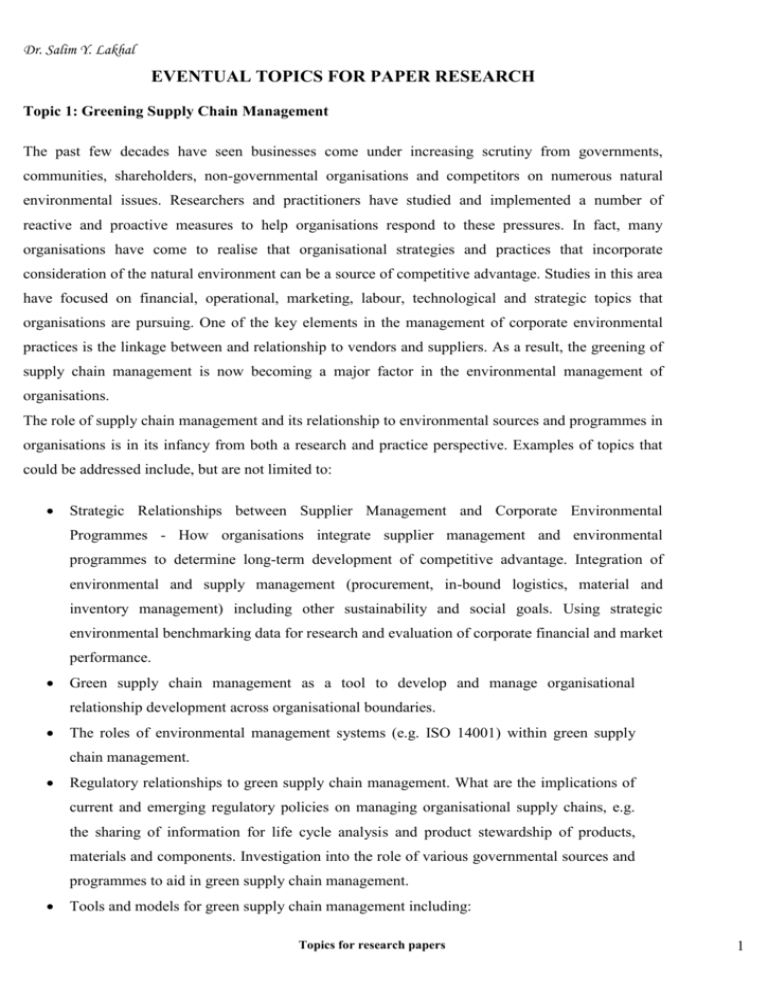
Dr. Salim Y. Lakhal EVENTUAL TOPICS FOR PAPER RESEARCH Topic 1: Greening Supply Chain Management The past few decades have seen businesses come under increasing scrutiny from governments, communities, shareholders, non-governmental organisations and competitors on numerous natural environmental issues. Researchers and practitioners have studied and implemented a number of reactive and proactive measures to help organisations respond to these pressures. In fact, many organisations have come to realise that organisational strategies and practices that incorporate consideration of the natural environment can be a source of competitive advantage. Studies in this area have focused on financial, operational, marketing, labour, technological and strategic topics that organisations are pursuing. One of the key elements in the management of corporate environmental practices is the linkage between and relationship to vendors and suppliers. As a result, the greening of supply chain management is now becoming a major factor in the environmental management of organisations. The role of supply chain management and its relationship to environmental sources and programmes in organisations is in its infancy from both a research and practice perspective. Examples of topics that could be addressed include, but are not limited to: Strategic Relationships between Supplier Management and Corporate Environmental Programmes - How organisations integrate supplier management and environmental programmes to determine long-term development of competitive advantage. Integration of environmental and supply management (procurement, in-bound logistics, material and inventory management) including other sustainability and social goals. Using strategic environmental benchmarking data for research and evaluation of corporate financial and market performance. Green supply chain management as a tool to develop and manage organisational relationship development across organisational boundaries. The roles of environmental management systems (e.g. ISO 14001) within green supply chain management. Regulatory relationships to green supply chain management. What are the implications of current and emerging regulatory policies on managing organisational supply chains, e.g. the sharing of information for life cycle analysis and product stewardship of products, materials and components. Investigation into the role of various governmental sources and programmes to aid in green supply chain management. Tools and models for green supply chain management including: Topics for research papers 1 Dr. Salim Y. Lakhal - Vendor selection methodologies that incorporate environmental criteria. - Vendor assessment and auditing approaches for current members. - Using the Internet and other pervasive information technologies to aid in green supply chain management. - Tools to help optimize transportation and in-bound logistics from an economic and environmental perspective. - Environmental benchmarking with respect to the supply chain. The role of green supply chain management within other operational management programmes such as total quality environmental management, just-in-time management, design for the environment, reverse logistics, and in-bound logistics. Topic 2: E-commerce Enabled Manufacturing Operations The management of materials, information, and other resources in organizations has expanded beyond the role of typical operations managers. Along with the breakdown of internal and external organizational boundaries has come the more open environment that may envelop organizational boundaries. Practitioners and managers throughout the world have realized the enormity and importance of these inter-organizational systems. Central to the development of these systems are concepts, technologies, and tools for electronic commerce. These issues are of critical importance to large, medium, and small-sized manufacturing firms. E-commerce encourages and supports communication and cooperation among various functions, vendors, and customers of organizations. Evolving e-commerce paradigms and practices are expected to be central enablers to operations and manufacturing concepts such as concurrent engineering, design for "x", supply chain management, computer integrated manufacturing, agile and virtual enterprising. Thus, its importance is strategically vital to organizations that wish to remain competitive. Practitioners have realized this importance by spending billions in e- commerce-enabled systems and practices, and supporting processes. Yet, researchers have been slow to critically investigate their roles, especially with respect to manufacturing organizations. Thus, you could help expand the field of knowledge in this area by working on this area. Your effort will deal on: Planning for E-commerce in Manufacturing and Operations settings - Organizational strategy, justification, and project management -Models and tools to integrate and incorporate e-commerce within strategic directions -Applications of tools through case studies Topics for research papers 2 Dr. Salim Y. Lakhal -Project management models (e-commerce linkages with internal systems) -Enterprise Resource Planning Systems -Web based enterprise integration and management Design and Analysis of E-commerce based Manufacturing systems Performance of E-commerce enabled Manufacturing and Operations systems - Decision Tools and approaches for systems development - Integration of e-commerce with existing and new operations business processes and policies - Architectures and Systems Models integrating manufacturing and operations with ECommerce Operations of E-commerce systems - Capacity and logistics planning and management - Materials management in an E-commerce setting - Scheduling in an E-commerce setting - Supply Chain management within an E-commerce setting - Virtual facility layout Monitoring and Control of E-commerce systems - Performance evaluation tools and techniques for E-commerce based operations systems - Decision support and expert systems and their development for the E-commerce enabled manufacturing setting - Cost Management and Product Pricing for E-commerce Enabled Systems Topic 3: Responsiveness and performance. Knowledge management initiatives are undertaken for the purpose of achieving better organizational efficiency and effectiveness, with the goal being to achieve superior performance. In this respect, spending resources on developing knowledge without a plan to use the knowledge to achieve success is of limited value to organizations. Critical to our understanding of the value of knowledge is its link to organizational responsiveness and performance outcomes. Knowledge management has performance implications at various levels in the organizations: individual process-level (such as supply chain cycle time, product development initiatives, and globalization efforts), functional level (such as performance of various organizational domestic and international units), and the overall performance of the organization (such as ROI and sales growth). A number of rigorous research methodologies are needed to address problems in each of the above areas and other areas related to knowledge management. Hence, analytical modeling approaches, theory driven empirical studies, case studies based on a company and field research are all welcome. Topics for research papers 3 Dr. Salim Y. Lakhal Topics for research papers 4



